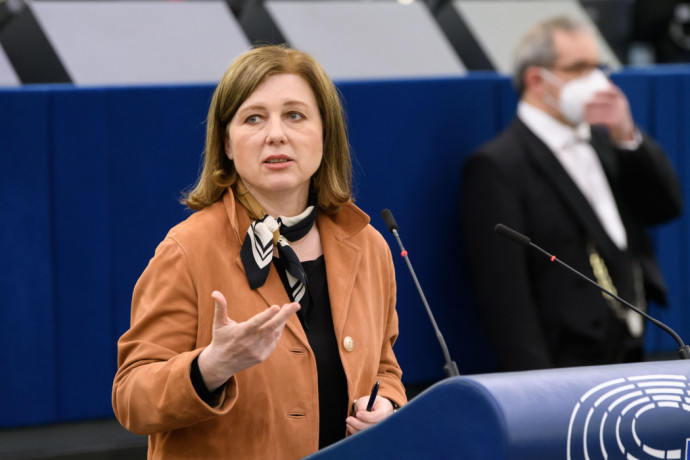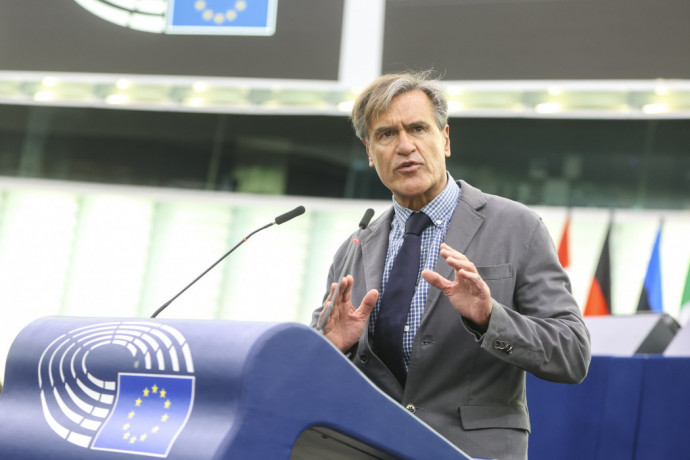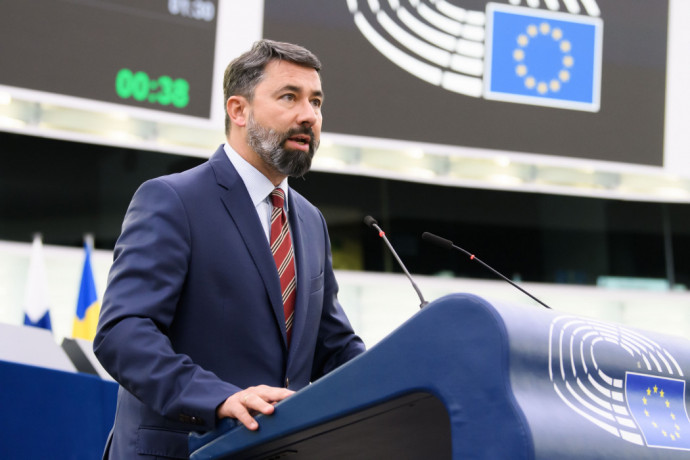Vera Jourová: Orbán is fully aware that if he wishes to stay in the EU, he needs to abide by its rules
The EP representatives are glad that the Conditionality Mechanism is being launched against the Hungarian government, but they are not satisfied: they agree that the European Commission should have taken this step much sooner – this would be the brief summary of the discussion at the EP’s plenary session held on Wednesday, about the state of the rule of law in Poland and Hungary, which was attended by Commission Vice President, Vera Jourová as well.
Jourová said that the situation in both Poland and Hungary remains worrisome, but while they do see some movement on the part of the Polish government, there is no such thing happening in Budapest. Whereas – as Jourová added – Orbán is well aware that remaining an EU member “is in Hungary’s best interest” – but in order for this to be possible, the Hungarian government must abide by the EU’s rules.
The Hungarian government’s hearing will be at the end of May
“At the beginning of his country’s presidency, president Macron said that the rule of law is a cornerstone of the EU, and since the start of the war in Ukraine, we need this even more” – said Clément Beaune, French Minister of State for European Affairs, representing the Council of the European Union.
While the GAC held a hearing for Poland back in February as part of the procedure based on article 7, this did not happen with Hungary due to the Russian-Ukrainian war. Beaune added that the Hungarian government’s time for presenting what reforms are being prepared in relation to the rule of law will come on 30 May.
“It is indispensable that both the EU institutions and the Member States contribute to upholding the rule of law” – stated Vera Jourová, the Commission’s Vice President. In her opinion, the February hearing helped determine that the situation in Poland regarding the rule of law continues to be seriously worrisome, although the Polish president and the governing party have already made some suggestions pertaining to the settling of some points of disagreement, (...) “the conversation about coming to an agreement with the Poles is still ongoing”.

According to Jourová, there has been no step forward in Hungary either, which is exactly why the Mechanism was launched against Orbán’s government on Tuesday. In addition, the Commission will soon publish its third rule of law report, which the Vice-President said would be a preventive tool, but hoped that the Hungarian and Polish authorities would "respond to the concerns highlighted".
Nobody’s power lasts forever
Following this, the representatives of the various EP caucuses spoke. Jerome Lenaers, Dutch EMP of the EPP caucus said that Poland and Hungary are to be evaluated separately. “Poland is not Hungary, and Hungary is not Poland. We welcome the news that the Commission has launched the Mechanism yesterday and informed the Hungarian authorities about it.”
The Dutch representative said that although “patience is running out” when it comes to dealing with the Polish government as well, and it is not the best timing to deal with questions about the rule of law in the midst of the war in Ukraine, ignoring the exact values that Ukrainians are currently fighting for would be cynical in the midst of this crisis.
A number of EPP representatives mentioned that the Hungarian elections “were not fair”, and said that for this reason the Commission and the Council should play a more active role in protecting the rule of law.
"We see that once again, a government that does not respect the rule of law has won in Hungary. Nobody is happy that we have to debate this again and that we have to trigger this mechanism against the Hungarian government. But if they don’t respect the rules, we cannot afford to do nothing. For the sake of the citizens of Poland and Hungary, the European Union must not remain idle” – commented Leaners’ Spanish colleague, Juan Fernando López Aguilar.

Ramona Strugariu from Romania was one of those who spoke on behalf of the liberal caucus, “Renew”. She said that the European institutions reacted too late regarding the issues concerning the rule of law, which “contributed to the autocrats getting stronger”.
She thanked the Hungarian united opposition for their perseverance and thanked all those who helped them – even though both the state and the media are controlled by the same party. Strugariu added that no power – whether it be Orbán’s or Putin’s – can last forever.
Tougher action was demanded
Green Party MEPs have called for much tougher action, with French MEP Gwendoline Delbos-Corfield, who had previously led the EP delegation to Hungary, saying that EU bodies have "done nothing for years" on the Article 7 procedure, when "it would be high time for introducing sanctions".
“A large part of society believes that the opposition would bring war to Hungary and would – with the EU’s support – introduce sex-change operations on children. This may be fiction for us, but for them, this is reality. (...) We must not support a European regime which is flirting with Putin’s regime” – said Delbos-Corfield.
Malin Björk, the Swedish MEP of the radical left spoke about rejoicing over the fact that the Commission is ready to launch the Mechanism, but doubts that the European Council – which is made up of the heads of state – would be willing to take further steps. “Because of the crisis in Ukraine, we cannot turn a blind eye to what is going on in Hungary. If we are not able to defend our values, then what is this whole Union about anyways?” – asked Björk.
No winner can take it all
Two Hungarian MEPs spoke as well.
According to Katalin Cseh from “Momentum”, there is no question about where Orbán’s most recent election win is going to lead. “They will continue to attack the independent press, and they will continue to incite hatred against minorities, and will further dismantle what is left of the independent judiciary. We are now at a point where members of the opposition are watched using intelligence tools, while – maybe because the Council has asked them, the EU institutions do nothing – said the member of the “Renew” caucus.

Balázs Hidvéghi was the Fidesz MEP present at the discussion, and he said: ”On Sunday, the Hungarian voters brought another landslide victory for Fidesz – this is something that nobody has been able to do in Central-Europe. This also shows that the Hungarian people reject all attempts to be influenced by the EU.
The question is, whether the EU institutions will be able to deal with us respectfully, or whether they will continue their ideological jihad. It looks like they intend to continue the latter, but the Hungarians reject this sort of arrogance.”
– Hidvéghi said.
Vera Jourová spoke at the end, and said that “the lack of trust is deeply concerning”, but that rule of law is a matter that must continue to be dealt with.
"Orbán says that it is in the Hungarian nation's best interest to stay in the EU, and I think Orbán understands that if he wants to stay in the EU, he has to abide by its rules. And a winner cannot take all: he cannot take the administration, the media, and the judiciary as well. If a winner takes everything, it is an autocracy"
– commented Jourová.
She added that the rule of law mechanism was not created for any specific country, but in the interest of protecting EU funds. “The reason we have taken steps against the Hungarian government with the Mechanism is because we consider it proven that this is necessary. The level of corruption in Poland is much lower, and we see that the Polish government is handling EU funds approriately – which is why we have not launched the Mechanism against them.”
The Vice President of the European Commision added that if all Member States had joined the EPPO, there would be no need for launching the Mechanism now.
To receive quick, accurate, and impartial news from and about Hungary straight into your inbox, don't forget to subscribe to the Telex English newsletter!